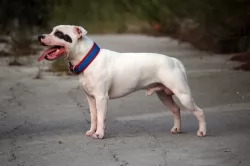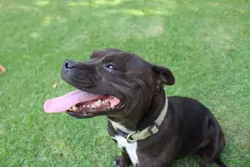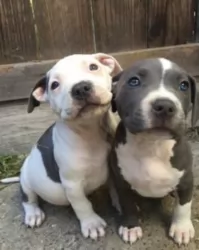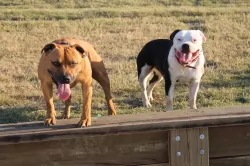 MyDogBreeds
MyDogBreeds Staffordshire Bull Terrier is originated from United Kingdom but Australian Kelpie is originated from Australia. Staffordshire Bull Terrier may grow 10 cm / 3 inches shorter than Australian Kelpie. Both Staffordshire Bull Terrier and Australian Kelpie are having almost same weight. Both Staffordshire Bull Terrier and Australian Kelpie has same life span. Both Staffordshire Bull Terrier and Australian Kelpie has same litter size. Staffordshire Bull Terrier requires Low maintenance. But Australian Kelpie requires Moderate maintenance
Staffordshire Bull Terrier is originated from United Kingdom but Australian Kelpie is originated from Australia. Staffordshire Bull Terrier may grow 10 cm / 3 inches shorter than Australian Kelpie. Both Staffordshire Bull Terrier and Australian Kelpie are having almost same weight. Both Staffordshire Bull Terrier and Australian Kelpie has same life span. Both Staffordshire Bull Terrier and Australian Kelpie has same litter size. Staffordshire Bull Terrier requires Low maintenance. But Australian Kelpie requires Moderate maintenance
 The Staffordshire Bull Terrier was first developed in the northern sections of Birmingham and in Staffordshire, England. The Staffie is a cross between a Black and Tan Terrie and the Bulldog, but had other breeds crossed in over time in order to create a bull-baiting dog and a fighting dog. In the Victorian age these sports were banned but dog fighting went underground and continues on some level today.
The Staffordshire Bull Terrier was first developed in the northern sections of Birmingham and in Staffordshire, England. The Staffie is a cross between a Black and Tan Terrie and the Bulldog, but had other breeds crossed in over time in order to create a bull-baiting dog and a fighting dog. In the Victorian age these sports were banned but dog fighting went underground and continues on some level today.
The Staffordshire Bull Terrier was exceptional at these “sports” due to his build, power and jaw strength. Today’s Staffie is a descendent of those early Bull Terrier crosses. Together with the Bull Terrier and the American Pit Bull, the Staffie also traces its roots back to those original English Bully dogs. All three breeds have the Bulldog in common.
After dog fighting and bull baiting were banned the Stafforshire Bull Terrier was further developed as a companion and pet. Still their reputation as fighting dogs cost them recognition in the official kennel clubs for some time. They finally made the UK registry in 1935, but it was not until 1974 that the American Kennel Club (AKC) accepted them.
 The energetic Kelpie came into being around 1870, with this working dog breed having a role to play with the herding of sheep in the harsh Australian outback.The sheep and wool industry in Australia has always been big business, and Australian ranchers were looking for a tough dog that could cope with sheep but also cope with the harsh environment.
The energetic Kelpie came into being around 1870, with this working dog breed having a role to play with the herding of sheep in the harsh Australian outback.The sheep and wool industry in Australia has always been big business, and Australian ranchers were looking for a tough dog that could cope with sheep but also cope with the harsh environment.
These are adaptable dogs too and their ancestors include the Coley or Collie, a British herding-type dog, the English- and the Australian Shepherd and the Dingo. In fact it is believed that up to 4% of their genes comes from the Dingo. These adaptable dogs were also brought to North America where they quickly adapted to the different climate and different livestock.
The Australian Kelpie isn’t your regular pet as they are essentially an outdoor, working dog. They are recognized today by the United Kennel Club and registered by the North American Australian Kelpie Registry.
 The Staffordshire is a muscular, stocky and unusually strong breed, small to medium size in height and build. They have broad, powerful chests, wide set, strong legs, strong shoulders, broad head with a fairly short muzzle. Their ears are not cropped but they are short and fold over. The coat is stiff, close and short and the tail is medium and carried low. Most Staffies are brown, but they can be red, brindle with white, fawn, black, white or blue.
The Staffordshire is a muscular, stocky and unusually strong breed, small to medium size in height and build. They have broad, powerful chests, wide set, strong legs, strong shoulders, broad head with a fairly short muzzle. Their ears are not cropped but they are short and fold over. The coat is stiff, close and short and the tail is medium and carried low. Most Staffies are brown, but they can be red, brindle with white, fawn, black, white or blue.
 The Kelpie is a medium-sized dog with a coat that comes in a number of colours – black, chocolate, fawn, red, blue, tan, white and gold. . The nose colour blends in with the dog’s coat colour and can be black, brownish and even pinkish.
The Kelpie is a medium-sized dog with a coat that comes in a number of colours – black, chocolate, fawn, red, blue, tan, white and gold. . The nose colour blends in with the dog’s coat colour and can be black, brownish and even pinkish.
The Kelpie has a medium-length tail which is low-set. The ears are pricked, giving the dog an intelligent, alert appearance. The dog’s head is also narrow and long, and his eyes are bright and inquisitive.
The Australian Kelpie has an athletic appearance, with a body which is longer than their height, similar to that of a German Shepherd. Because the Australian Kelpie is such an energetic, active breed, he’ll need plenty of ‘jobs to do’, lots of ball games and other exercise to keep him free from boredom and to ensure he maintains his lithe, lean, muscular limbs.
 1.Children friendliness The breed adores children but care should still be taken because they are so strong and their jaws are so powerful.
1.Children friendliness The breed adores children but care should still be taken because they are so strong and their jaws are so powerful.
2.Special talents they adore children and they one of the most powerful jaws among canines.
 The Australian Kelpie is an active, busy, intelligent, loving breed who is highly protective of his human family. He gets on well with children and other pets in the home but you’ll want him trained if you want him to be gentle around children and smaller pets. He does tend to gravitate towards one particular family member as his ‘favourite’ though.
The Australian Kelpie is an active, busy, intelligent, loving breed who is highly protective of his human family. He gets on well with children and other pets in the home but you’ll want him trained if you want him to be gentle around children and smaller pets. He does tend to gravitate towards one particular family member as his ‘favourite’ though.
Your Kelpie won't do well in an apartment as he is a working dog who wants plenty of place to run and play. If he is bored, it manifests itself with constant barking. Make sure to provide a stimulating, active lifestyle for your Australian Kelpie, provide him with everything a dog needs and you’ll be rewarded with a devoted and loyal companion.
 • Patella luxation otherwise known as a slipped kneecap- can cause pain and some lameness.
• Patella luxation otherwise known as a slipped kneecap- can cause pain and some lameness.
• Skin allergies and even a tendency toward Mange which is chronic in some forms and fatal in others.
• Like most active dogs their size, they are susceptible to bloat which can be fatal if not treated immediately.
 Your Australian Kelpie is a hardy breed and you won’t find many health problems with him. Yes, every dog is susceptible to illnesses which are common with all dog breeds, and these are illnesses such as hip dysplasia and cryptorchidism.
Your Australian Kelpie is a hardy breed and you won’t find many health problems with him. Yes, every dog is susceptible to illnesses which are common with all dog breeds, and these are illnesses such as hip dysplasia and cryptorchidism.
You will need to check your Kelpie out for eye disease such as PRA or Progressive Retinal Atrophy, a group of genetic diseases which are found in some breeds of dogs. This can lead to cataracts and blindness.
Health problems in your Australian Kelpie can certainly be partially prevented by the way you feed your dog and by the environment you provide him with. Every dog has the potential to develop genetic health problems, but as we’ve said, the Kelpie is a generally healthy breed.
Always find a reputable breeder whose focus is on breeding healthy dogs and who can provide certification that the parents of the dog are clear of defects and are in tip-top condition for breeding.
Along with quality food and fresh water, getting your puppy vaccinated is hugely important. Australian Kelpie puppy shots will protect your new 4-legged family member from the likes of distemper, parvovirus and hepatitis. Your puppy will also need additional booster vaccinations after his first shots which start at around 8 weeks of age.
 1.Feeding the puppy Don’t over feed as he grows fast. Feed a high quality dog food for medium size puppies. Feed 1-2 and a quarter cups in 3-4 meals per day.
1.Feeding the puppy Don’t over feed as he grows fast. Feed a high quality dog food for medium size puppies. Feed 1-2 and a quarter cups in 3-4 meals per day.
2.Feeding the adult Don’t exercise right before or after eating due to potential for bloat. Feed 1-2 times a day a high quality medium breed dog food.
4. Games and Exercises They are terriers after all and they dig. Need a fairly large yard with a strong fence. They love to play ball, frisbee and can excel at cart pulling.
 Australian Kelpies are low maintenance and their coat is easy to groom and maintain. You want to give him a good brush twice a week to get rid of loose hair. Australian Kelpies are moderate shedders.
Australian Kelpies are low maintenance and their coat is easy to groom and maintain. You want to give him a good brush twice a week to get rid of loose hair. Australian Kelpies are moderate shedders.
It is important to get your puppy off on the right foot to avoid health problems later on. Homemade dog food which includes chicken, rice and vegetables is always the best food for your dog. If you can't prepared your own meals for your Kelpie, top grade commercial dog food brands are recommended.
When looking at dog foods, remember that your Kelpie is a working dog – a naturally active breed and you’ll need to look at dog food which has been specially formulated for active dogs. Every dog will need raw meat in their diet if you want to avoid a dog with an itchy, flaky skin, a dog with poor energy levels and a dog that has no resistance to infection.
Every owner who cares for their dog will provide him with socialization and training. The Australian Kelpie is an intelligent breed who responds well to training.